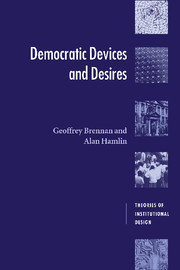Book contents
- Frontmatter
- Contents
- List of figures
- Preface and acknowledgements
- 1 Introduction
- Part 1 Democratic desires
- 2 On human nature: beyond homo economicus
- 3 Moral dispositions
- 4 Economising on virtue
- 5 Political mechanisms
- 6 Mechanisms and dispositional choice
- 7 Problems of democratic politics
- Part II Democratic devices
- Bibliography
- Index
2 - On human nature: beyond homo economicus
Published online by Cambridge University Press: 22 September 2009
- Frontmatter
- Contents
- List of figures
- Preface and acknowledgements
- 1 Introduction
- Part 1 Democratic desires
- 2 On human nature: beyond homo economicus
- 3 Moral dispositions
- 4 Economising on virtue
- 5 Political mechanisms
- 6 Mechanisms and dispositional choice
- 7 Problems of democratic politics
- Part II Democratic devices
- Bibliography
- Index
Summary
The supposition of universal venality in human nature is little less an error in political reasoning than the supposition of universal rectitude. The institution of delegated power implies that there is a portion of virtue and honor among mankind, which may be a reasonable foundation of confidence. And experience justifies the theory. It has been found to exist in the most corrupt periods of the most corrupt governments.
(Federalist papers, 76, Alexander Hamilton)Motivation in politics
It seems self-evident that any account of the operation of democratic political institutions must depend on assumptions made about human nature – and specifically about human motivation. After all, within the analytic tradition that we will be working in – the rational actor tradition – human behaviour is understood as the outcome of rational choices, and rational choice is understood in terms of agents' beliefs and desires. The rational option, in the standard Humean/Davidsonian account, is just that option that maximises the agent's desire satisfaction, given the agent's beliefs (beliefs, say, about the consequences of alternative actions). Economists may, in most settings, talk about preferences rather than desires, but the Humean story – or something very like it – underlies virtually all modern economics and correspondingly all rational actor political theory.
Not all scholars admire the rational actor approach to politics. Their criticisms are varied and we will not try to address them all in this book.
- Type
- Chapter
- Information
- Democratic Devices and Desires , pp. 17 - 33Publisher: Cambridge University PressPrint publication year: 2000



